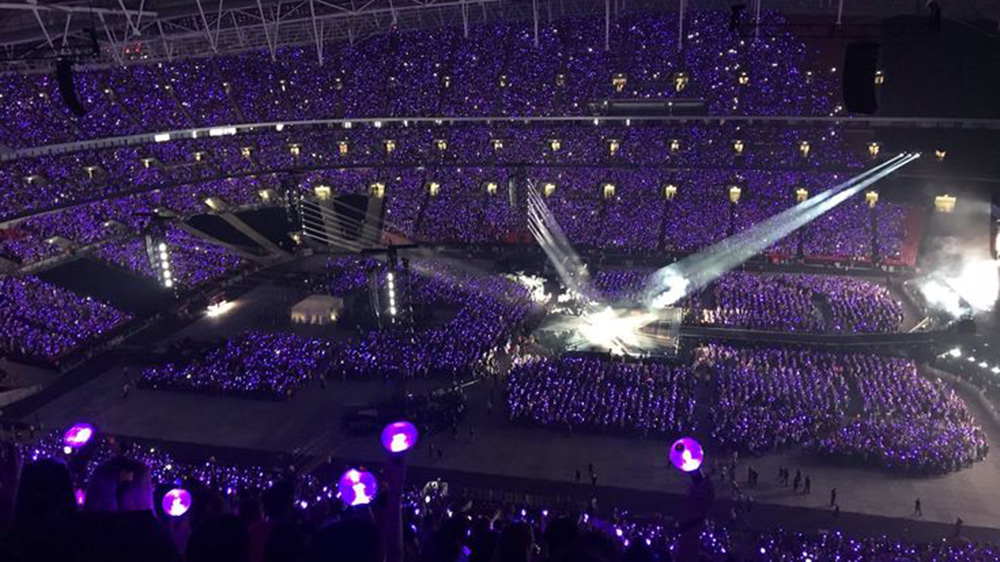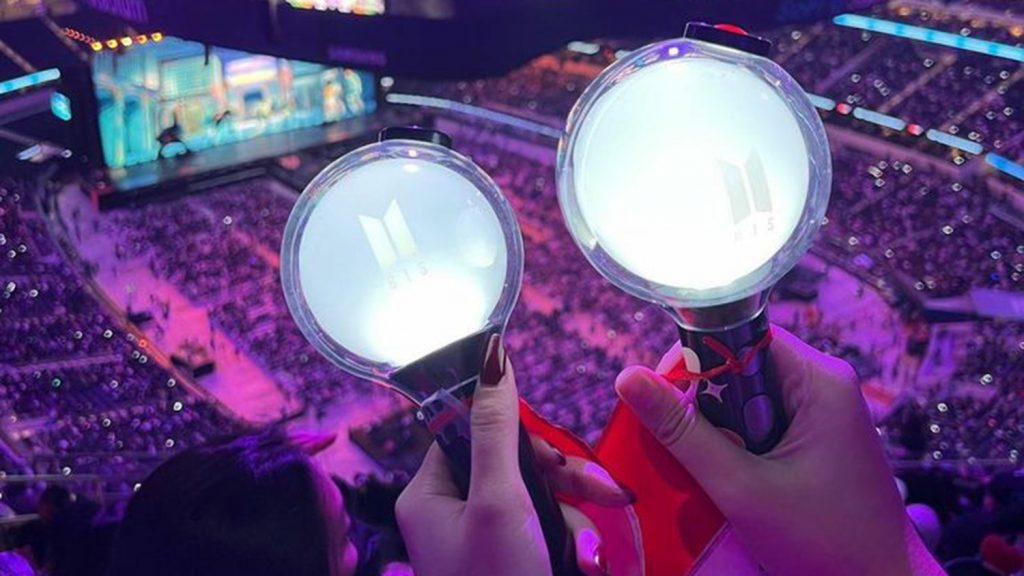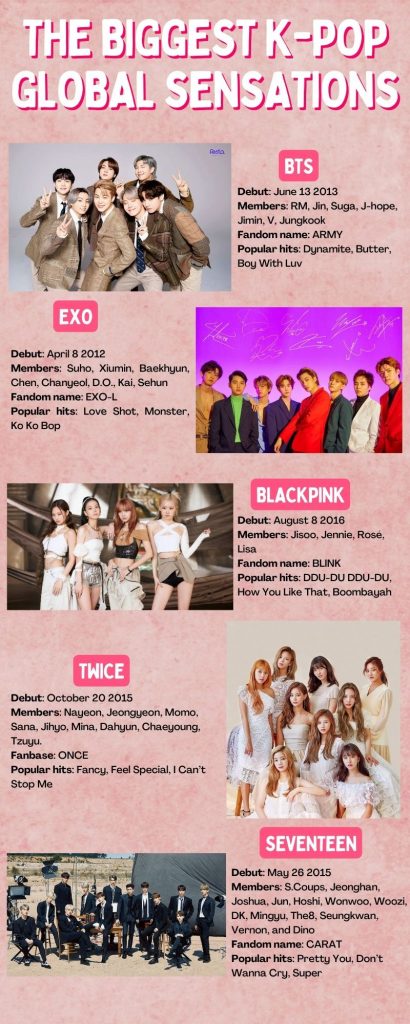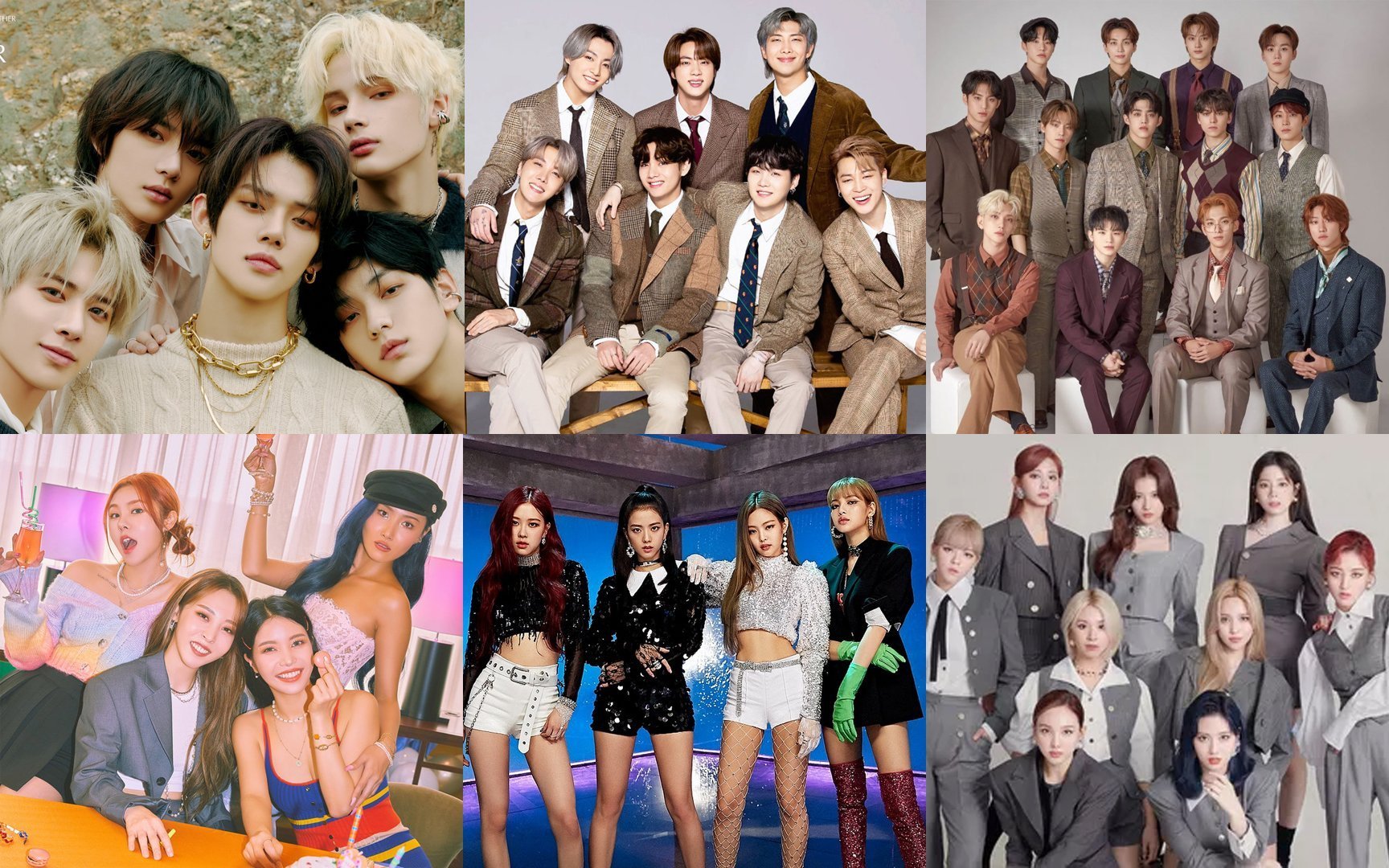As K-pop grew in popularity in the UK, how has it come to dominate the British charts and push Western bands out of the top ten?
Anya’s bedroom was a shrine to a world far away. The walls, covered with posters of perfectly styled idols, and her shelves, overflowing with albums, photocards, and other memorabilia. It was a sanctuary where she could escape the mundane and immerse herself in a world of colour and music.
For her, K-pop is more than just a music genre, it is an escape into a world that feels welcoming. “When I first discovered K-pop, it was like finding a missing piece of myself,” she says. “The music, the visuals, the energy- it all resonated with me in a way I couldn’t understand.”
In the UK, a country known for its rich musical heritage that birthed legends like The Beatles and The Rolling Stones, a new musical wave is taking over. The Korean pop music industry, or K-pop, has not only gained a foothold but is also challenging the dominance of Western pop, which is evidenced by the genre’s performance in the UK charts.
While Anya’s bedroom might be a personal testament to K-pop’s influence in the UK, the evidence of its success goes far beyond individual fans. The Official Charts Company reports a significant increase in K-pop album sales in the UK, with the boy band BTS’s “Map Of the Soul: 7” becoming the first Korean language album to reach number one in 2020. Sold-out concerts and booming K-Pop merchandise sales further solidify the genre’s commercial power.

Fans queue around the block for merchandise, and K-pop concerts sell out massive venues like London’s Wembley Stadium, where BTS performed to over 60,000 fans each night in 2019. This level of fan engagement illustrates how K-pop has captivated a significant audience in a traditionally Western-dominated market.
Earlier this year, the thirteen member boy group, Seventeen, made history as the first ever K-pop group on the Glastonbury music festival lineup. This was the first time the K-pop genre was featured at this world famous festival, held at Worthy Farm, Somerset. Seventeen’s inclusion in the lineup signalled a significant milestone not only for the group but also for the global reach of K-pop as a whole.
Dr. Sarah A. Son, a senior lecturer in Korean Studies at the University of Sheffield, points out the significance of this shift. “K-pop has definitely disrupted the music scene in the UK. It has challenged traditional pop formulas and attracted a brand-new generation of fans,” she says.
K-pop could be described as “pop music on steroids” as it is a genre where every element is intensified to engage audiences on multiple levels. K-pop’s formula combines catchy melodies, synchronised choreography, and visually stunning music videos that offer fans a complete entertainment package.
This combination of elements isn’t accidental. According to a 2018 report by The Korea Foundation, K-pop idols undergo years of rigorous training to perfect their singing, dancing, and even acting skills. The process is meticulously designed to ensure that every performance is flawless, which is evident in the synchronisation and energetic stage presence of groups like BTS and BLACKPINK.
“K-pop’s ability to blend pitch perfect vocals with visually stunning performances, along with a strong emphasis on fan engagement, has created a new music style which is different from Western acts,” said Dr. Son.

Chloe, a 20 year old fan, pointed out how K-pop’s structure keeps her engaged. “K-pop, in my opinion, is generally less ‘boring’ than other genres because the songs usually have a rap part, a dance break, and high vocals towards the end. It’s not just about the music; it’s about the performance, the visuals, and the interaction with fans. This combination makes it more entertaining,” she said.
The commitment to high-quality production is evident not only in performances but also in the way K-pop interacts with its fan base. Fans are integral to K-pop’s success, participating in activities that range from streaming campaigns to elaborate fan events.
The ‘addictive’ formula in K-pop has proven to be highly lucrative. The industry is a well-oiled machine that generates substantial revenues through album sales, concert tickets, merchandise and digital streaming. “K-pop has mastered the art of monetisation,” Dr. Son says. “The industry has this ability to create the so-called sense of exclusivity through limited edition products. This is how the fans feel more attached to their favourite artists by spending money for them,” she said.
The economic footprint of K-pop in the UK is substantial. The BTS pop-up store in London, opened in 2020, saw fans queuing for hours to purchase exclusive items. Concerts generate significant revenue, not just from ticket sales but also from spending on travel, accommodation and dining.
For fans, attending a live concert is not just about enjoying the music. It is an immersive experience that creates lasting memories and friendship. For Anya, attending concerts gave her unexpected bonds. “Never in my life have I thought I would bond over K-pop with random strangers I have met. Now, I have got amazing friends with whom I can fangirl with,” she said.
K-pop’s global reach is also reinforced by the strategic use of digital platforms. The rise of streaming services like Spotify and YouTube has made K-pop more accessible than ever. The UK is among the top 10 countries that follow Korean artists on Spotify, with K-pop streams surpassing 7 billion in 2022.

Sarah Treharne, a 22-year-old fan, uses Spotify to stay connected with her favourite artists. “I listen to K-pop daily, whether I’m travelling, studying, or relaxing. It makes streaming effortless,” she says.
Another crucial aspect of K-pop’s success is its visually appealing aesthetics. Idols are often noted for their striking appearances, a result of strict beauty standards and grooming processes. “The visual appeal of K-pop idols shows an ideal of perfection. It is highly curated, from fashion choices to makeup, everything is designed to make them look attractive,” says Dr. Son.
Furthermore, the inclusion of foreign members in K-pop groups and the strategic use of English lyrics help K-pop transcend language barriers and connect with international audiences. This blend of familiarity and novelty makes K-pop both accessible and exotic, offering something different from the typical Western pop experience.
Another testament to K-pop’s influence in the UK is its successful collaborations with British artists, blending the best of both music genres. For instance, BTS’s collaboration with Ed Sheeran on the hit single “Permission to Dance” combined Sheeran’s songwriting skills with BTS’s dynamic performance style. This collaboration excited British fans, and also hit number one in BillBoard Top 100 charts.
BLACKPINK also teamed up with British pop star Dua Lipa for the track “Kiss and Make Up,” a collaboration that seamlessly blended K-pop energy with Western pop sensibilities. These partnerships highlight how K-pop is adapting to Western music style, bridging cultures and expanding its appeal across different musical landscapes.
Sarah hopes to see more K-pop artists teaming with British producers and artists. “It would be awesome to hear K-pop mixed with some British sounds and styles. I think it is a great way for the music to get more Brits hooked,” she said.
One of K-pop’s most defining features is its ability to foster a deep sense of community and belonging among its fans. Chloe’s personal experience reflects this strong sense of community. “Community is important because it creates social interactions. Waiting for people’s opinions on releases or chatting with other fans makes people happy. And since K-pop is considered ‘cringe’ by most people outside of K-pop, finding someone who shares this interest feels special. It’s like a rare connection,” she said.

In addition, the relationship between idols and fans is carefully cultivated. K-pop agencies employ sophisticated marketing strategies that go beyond just selling music, they create an experience. Social media plays a crucial role in this, allowing fans to feel a sense of intimacy with their idols through regular updates, personal messages, and exclusive content.
“BTS, for example, pioneered this in the K-pop space by holding special fan events online. This created a sense of intimacy with their fans. This strategy has been very effective in maintaining their fan base long-term,” Dr. Son notes. The level of fan engagement goes beyond what is typical for Western artists, with fans often participating in coordinated efforts to promote their favourite artists, from streaming campaigns to charitable donations.
Despite its popularity and impressive achievements, Dr. Son believes that K-pop is still more of a niche phenomenon in the UK rather than a mainstream sensation, as the genre is only popular among the younger demographic. “To be honest, I think the K-pop industry and the Korean government sometimes overestimate its popularity in places like the UK. It often surprises me that it is still a niche interest in the UK. It is not quite mainstream yet,” she said.
However fans believe that K-pop will only grow into a mainstream genre. They have high hopes for how this type of music will continue to evolve to fit British tastes. “I definitely think K-pop is going to become even more popular here. I see more people talking about it and getting interested,” Anya said.
Digital platforms will continue to play a crucial role in K-pop’s continued success. Its rapid expansion is closely linked to its strategic use of streaming services.
It often surprises me that it is still a niche interest in the UK. It is not quite mainstream yet.
Dr. Sarah A. Son, senior lecturer, Korean Studies, University of Sheffield
As K-pop continues to capture the hearts of fans around the world, its influence on the global music scene is becoming more pronounced. The genre’s ability to innovate and adapt suggests that it will continue to grow, finding new ways to engage audiences and maintain its relevance. Dr. Son believes that K-pop’s future is promising, given its track record of responsiveness to market demands and constant innovation.
“Korea, as a nation, is very tenacious. They work hard to succeed in any industry, and K-pop is very responsive to its market. Wherever the K-pop industry needs to innovate or change to keep winning audiences, it will do so. In the UK, seeing their performance in charts, K-pop has all potential to become mainstream real soon,” says Dr. Son.
Whether through sold-out concerts, chart topping albums or groundbreaking digital content, K-pop is set to leave an indelible mark on the UK music scene and beyond. The journey of K-pop in the UK promises an exciting evolution that will bring out new listeners and form bigger fandoms.
For fans like Anya, K-pop’s evolving presence in the UK is more than just a trend—it’s a personal journey that resonates deeply. Anya’s experience reflects the profound impact that K-pop can have on individuals, offering more than just entertainment. It provides a sense of community and belonging, something that is increasingly evident as the genre makes its mark on the UK’s music landscape.
“K-pop has opened a new world for me. It’s not just about the music, it’s about the connections, the shared experiences, and the joy of discovering something that feels like it was made just for me,” she said. “It is a growing phenomenon in the UK, and I can’t wait to see how it evolves. The best is yet to come.”

